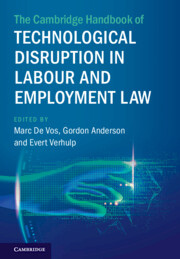Book contents
- The Cambridge Handbook of Technological Disruption in Labour and Employment Law
- The Cambridge Handbook of Technological Disruption in Labour and Employment Law
- Copyright page
- Contents
- Figures
- Tables
- Contributors
- 1 Technology and Law for the Future of Work We Want
- 2 The International Labour Organisation and the Future of Work
- 3 The Digitalisation of Work and the EU: Jurisprudential and Regulatory Responses in the Labour and Social Field
- 4 The Impact of Technological Disruption on German Labour Law: Risks and Opportunities
- 5 Austria: The Corporatist Perspective on Technological Disruption
- 6 Technological Disruption in Employment and Labour Law in the Netherlands
- 7 The Digitalisation of Labour Law in France
- 8 Italian Labour Law: Trends and Developments Put to the Test of Technological Disruption
- 9 Spain: Towards a New Architecture for Labour Law Institutions
- 10 Technological Developments and Industrial Relations in Denmark
- 11 Poland: Old and New Legal Concepts in the Changing World of Work
- 12 Technological Disruption and the Evolution of Labour Law in Hungary
- 13 Digitalisation and Disruption of Labour Relations in Estonia
- 14 Israel: New Trends in Israeli Labour and Employment Law
- 15 United Kingdom: Labour Law and Technological Authoritarianism at Work: Past, Present, and Future
- 16 Old Problems and New Technologies in the American Workplace
- 17 Australia: Reimagining the Regulation of Work
- 18 Technological Disruption and the Future of Work in Aotearoa/New Zealand
- 19 Technological Disruptions in Labour and Employment Law: South Africa
- 20 Japan: Labour Law and Policy in an Era of Technological Innovation
- 21 The Republic of Korea: Old Regulations and New Challenges in the World of Work
- 22 Technological Disruption and Labour Law: Between Utopia and Dystopia
1 - Technology and Law for the Future of Work We Want
Published online by Cambridge University Press: 07 December 2023
- The Cambridge Handbook of Technological Disruption in Labour and Employment Law
- The Cambridge Handbook of Technological Disruption in Labour and Employment Law
- Copyright page
- Contents
- Figures
- Tables
- Contributors
- 1 Technology and Law for the Future of Work We Want
- 2 The International Labour Organisation and the Future of Work
- 3 The Digitalisation of Work and the EU: Jurisprudential and Regulatory Responses in the Labour and Social Field
- 4 The Impact of Technological Disruption on German Labour Law: Risks and Opportunities
- 5 Austria: The Corporatist Perspective on Technological Disruption
- 6 Technological Disruption in Employment and Labour Law in the Netherlands
- 7 The Digitalisation of Labour Law in France
- 8 Italian Labour Law: Trends and Developments Put to the Test of Technological Disruption
- 9 Spain: Towards a New Architecture for Labour Law Institutions
- 10 Technological Developments and Industrial Relations in Denmark
- 11 Poland: Old and New Legal Concepts in the Changing World of Work
- 12 Technological Disruption and the Evolution of Labour Law in Hungary
- 13 Digitalisation and Disruption of Labour Relations in Estonia
- 14 Israel: New Trends in Israeli Labour and Employment Law
- 15 United Kingdom: Labour Law and Technological Authoritarianism at Work: Past, Present, and Future
- 16 Old Problems and New Technologies in the American Workplace
- 17 Australia: Reimagining the Regulation of Work
- 18 Technological Disruption and the Future of Work in Aotearoa/New Zealand
- 19 Technological Disruptions in Labour and Employment Law: South Africa
- 20 Japan: Labour Law and Policy in an Era of Technological Innovation
- 21 The Republic of Korea: Old Regulations and New Challenges in the World of Work
- 22 Technological Disruption and Labour Law: Between Utopia and Dystopia
Summary
The nature of work, the substance of jobs, the types of party involved, their legal and operational relationships, the formation of those working relationships: there is very little in the world of work that is not subject to some form of technology-driven transformation. This, perhaps, is nothing new. After all, modern labour and employment law emerged as a response to a technologically induced industrial revolution that triggered wholesale societal transformation. As some observers predict the most radical change in the labour market since the first industrial revolution, this begs the question: if the future of work is set to change, what will the future of labour law be? If technology is disrupting employment, how is it causing a disruption in labour and employment law?
Keywords
- Type
- Chapter
- Information
- Publisher: Cambridge University PressPrint publication year: 2023

